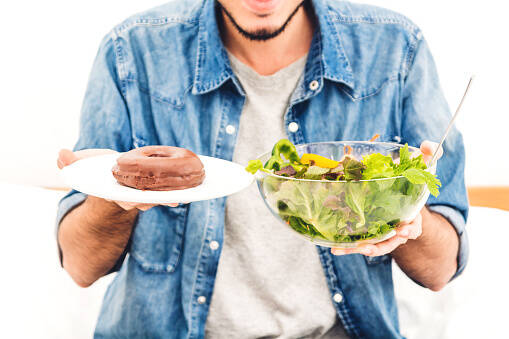- solen.cz - Acute pancreatitis
- solen.sk - Diagnostics of acute pancreatitis
- hospital-bojnice.sk - Information sheet for patients with pancreatitis
What diet is best for pancreatitis?

Pancreatitis afflicts a high percentage of patients. It causes various problems, including pain, which cannot be managed without medication and a strict diet. Proper diet and strict dietary restrictions are important, especially in the acute phase of the disease.
Article content
The pancreas is an 18-25cm organ of the digestive system and lies in the upper abdominal cavity behind the stomach. Specifically, it is a gland with predominantly exocrine but also endocrine secretion.
Pancreatic secretion occurs at two levels:
- Exocrine secretion means the production of pancreatic juice. About 1 to 3 litres of pancreatic juice is produced daily in the pancreas. Its secretion is conditioned by nervous and chemical stimuli. Pancreatic juice, together with intestinal juices, is involved in the digestion of sugars, fats and proteins. This process takes place in the islets of Langerhans in the pancreas.
- Endocrine secretion means the production of the hormone insulin, which is formed in the islets of Langerhans in the pancreas. They number about 1.5 million and are morphologically distinct from the rest of the pancreatic tissue.
Pancreatic diseases cause digestive problems
In diseases of the pancreas, and therefore also in its inflammation (pancreatitis), the digestion of fats is primarily impaired. The impaired digestion of fats is also indicated by stools that are pale (chollic), greasy and shiny (full of fats). Stools in pancreatitis also contain various undigested food debris.
The balancing of blood glucose levels is also disturbed. This is because the insulin that is formed in the pancreas is the guideline for its optimal values. This is especially dangerous in patients suffering from diabetes mellitus.
Pancreatitis requires dietary restrictions
A diet is necessary for patients with pancreatitis.
Since the diseased pancreas is unable to digest fats, sugars and proteins as well as a healthy one, all these components must be restricted during the acute phase of the disease.
How is the pancreas involved in digestion?
In addition to gastric, intestinal and gallbladder juices, pancreatic juice is involved in the digestion of food components. Pancreatic juice is a strongly alkaline fluid secreted by the pancreas. Two hormones, secretin and pancreatic juice, are involved in its production.
The juice passes from the pancreas into the duodenum and stomach, where it creates an alkaline reaction and thus neutralises the acidic gastric juice, or its digestive substance called chymus. Its next stop is the small intestine, where it helps to break down the remaining nutrients into their simplest substances.
Interesting:
The amount of pancreatic juice and its composition is not always the same. It varies according to the food you eat.
Thus, pancreatic juice contains various enzymes and their complexes that break down the main components of food. We are talking about fats, sugars and proteins. In pancreatitis, its formation and also excretion is disturbed, resulting in a disorder in the digestion of food components.
Read also:
What should you know about pancreatitis?
Pancreatic enzyme table:
| The main enzymes | Food components |
| Trypsin complex | breaks down mainly proteins |
| Pancreatic lipase | breaks down emulsified fats into fatty acids and glycerol |
| Pancreatic amylase | cleaves starch into simple sugars |
These foods are completely unsuitable for pancreatitis patients!
Pancreatitis is a severe disease manifested by severe abdominal pain for several hours to a day. It usually occurs after eating or is triggered by food. It is localized in the upper abdomen, more to the left or middle. In the chronic course of the disease, patients feel it around the navel. It worsens in the supine position. Indeed, very mild relief occurs in the quadrupedal position, which the patient often forces.
Certain foods irritate the pancreas more than others. Any patient diagnosed with pancreatitis should therefore be very consistent in which delicacies he includes in his diet and which he omits altogether. He should also be aware of what momentary gluttony may cause.
Alcohol should be avoided altogether
Alcoholic drinks have a negative effect on the entire digestive tract, from the oral cavity to the intestinal lining.
Read also:
Alcoholism
Do you know whatalcoholism does to your health?
Alcohol poisoning is on the rise during the holiday season
They are also crucial in the development of pancreatitis, worsening its course and also treatment options. They trigger a pancreatic attack that causes severe pain, in some cases, other health problems.
Caution:
A small amount of alcohol consumed sporadically will not cause pancreatitis in any case.
This possibility increases in direct proportion to the amount of alcohol consumed and the length of time that alcohol is consumed regularly.
However, in patients diagnosed with pancreatitis, even minimal amounts of alcohol cause a pancreatic attack.
Stop smoking as soon as possible!
How can smoking cause pancreatitis? Quite simply. By inhaling cigarette smoke, we inhale a number of harmful substances and carcinogens. These substances also irritate and damage the pancreas.
Patients with pancreatitis know very well that one cigarette can trigger a painful pancreatic attack. Many smokers can testify that they have felt a prickling sensation and slight pain under the left rib arch on more than one occasion when smoking large quantities of cigarettes.
Interesting:
Did you think nicotine causes cancer?
Not in the slightest!
Cancer, and other diseases, are caused by other dangerous substances in cigarettes.
Nicotine itself is not a carcinogen. It is the substance that makes us continue to smoke.
It is the substance that causes cigarette addiction.
Even the strength of the addiction is often compared to heroin.
Can't imagine a morning without coffee? Better try it.
Coffee and caffeine are pancreatic irritants. They should never be consumed by a patient in the acute phase of the disease.
In the chronic or asymptomatic phase of the disease, morning coffee can also trigger a cascade of pain, nausea and vomiting. It is best to avoid caffeine products altogether, including energy drinks, or to minimise their consumption.
Are you also a carnivore?
The worst thing you can do for your pancreas, apart from abusing alcohol, is excessive consumption of fatty animal meats, but also excessive intake of fats as such. Since the digestion of fats is most impaired in pancreatitis, their excessive intake can end in disaster.
The fattiest meats and products:
- Pork (ribs, neck)
- pork rinds
- pork fat
- pork preparations (salami)
- bacon
- crackling
- mutton
- wild game meat (goulash)
- duck meat
- duck fat
- goose
- goose fat
- smoked meat (ribs, sausage)
- offal, especially liver
- canned meat products
- canned fish
- fried food
- eggs
Did you think that fruit and vegetables can't harm you?
Fruits and vegetables are among the healthiest foods ever. They are recommended by all doctors for almost all diseases. A healthy diet is essential.
However, for some diseases, even some healthy foods can cause health problems.
For some people citrus fruits can cause heartburn, for others apricots can cause constipation or diarrhoea.
Healthy foods that pancreatic patients cannot eat:
- Raspberries
- Strawberries
- blueberries
- cranberries
- gooseberries
- currants
- pears
- grapes
- nuts (high in fat)
- capers
- olives
- sauerkraut
- kale
- pickles (sour pickles)
- garlic
- onions
- radish
- green pepper
- chilli peppers
Avoid dairy products
Dairy products are abundant on the market. They are generally considered to be very healthy and in many ways beneficial foods. We are taught from a young age that if we drink plenty of milk we will have healthy bones.
But not all dairy products are suitable for all people. Especially not full-fat ones, i.e. those with a high fat content. Fats, as already mentioned, are a major problem in pancreatitis. Therefore, patients with pancreatitis should minimise their intake or seek out only low-fat ones.
Dairy products are inappropriate in pancreatitis:
- whole milk
- cooking and coffee creamers
- whipped cream
- full-fat yoghurt
- full-fat cheeses
- bryndza
- mayonnaises, mayonnaise salads
- tartar sauce
- ice cream
Do you love sweets and cookies?
Sweet lovers have a serious problem. A damaged pancreas does not like sweets and cakes so much. Sweets, but also flour products such as cakes and pastries, are unsuitable in pancreatitis.
There is no point in naming specific confectionery products, as all of them contain high amounts of sugars and burden the digestion.
Read also:
Sugar: our sweetest enemy
Are you one of those who like to add flavour?
Spices, flavourings, food additives. They are used to flavour all specialities. They are added in small quantities, which, however, can produce a big problem.
The most dangerous spices:
- Black pepper
- Multi-coloured pepper
- chilli
- curry spices
- red peppers
- broths for soups
- vegeta
- excessive salt
What can you consume in the acute phase of pancreatitis?
The acute phase of pancreatitis, i.e. the condition in which the patient has developed and persists in the symptoms of the disease, is hell on earth. Pain, lack of appetite and vomiting do not allow him to eat. Moreover, overeating would only worsen the course.
In the most severe cases, the patient is hospitalized and receives food exclusively through a mushy, non-irritating nasogastric tube.
In the early stages of the disease, it is best to consume only biscuits with unsweetened tea or water.
During the treatment of the disease and pain control with analgesics, other non-irritating foods can be gradually added.
The guiding principle is to avoid fatty foods and foods high in fat.
When the condition regresses, the diet is supplemented with vegetable fats. Their daily intake should not exceed 80 grams.
The intake of animal fats should be kept to a minimum even during the resting period.
Foods that are allowed
There are enough foods that are non-irritating and suitable for a patient with pancreatitis to enable him to develop a rich diet. After that, it is just a matter of getting used to the change in diet.
With proper eating habits, attacks of pain and complications are possible but kept to a minimum.
Appropriate foods in a patient with pancreatitis:
- plain water, non-bubbly and non-carbonated drinks (herbal teas, fruit juices, table water)
- lean meat without skin and bones (chicken, turkey, beef, rabbit) prepared by water, steam or grill (do not overcook)
- light meat products (diet salami, lean chicken or turkey ham, diet sausages)
- grilled fish (salmon, cod)
- vegetable fats (low-fat butter, olive oil, flaxseed oil)
- low-fat dairy products such as low-fat milk, yoghurt, cheese (sheep's cheese), cottage cheese
- vegetables (iceberg lettuce, spinach, carrots, parsley, celery, hokkaido squash, beets)
- fruit, if eaten without peels and pips (apples, bananas, apricots, cherries, sour cherries, oranges, lemons, compotes)
- as flavourings, bay leaves, chives, dill, marjoram, cumin, cloves can be used
Interesting resources










